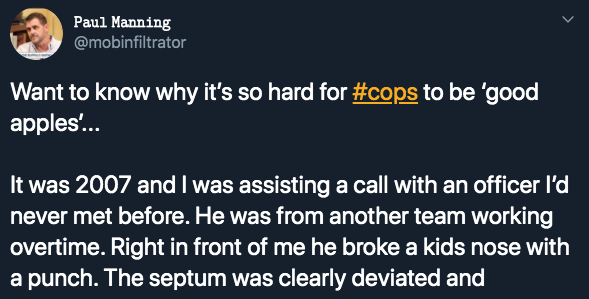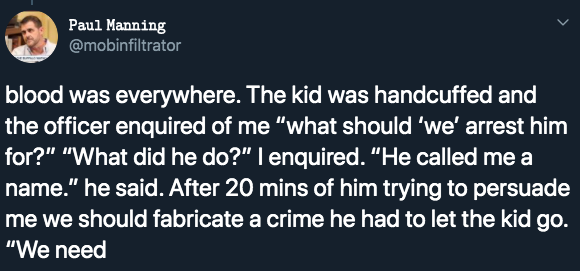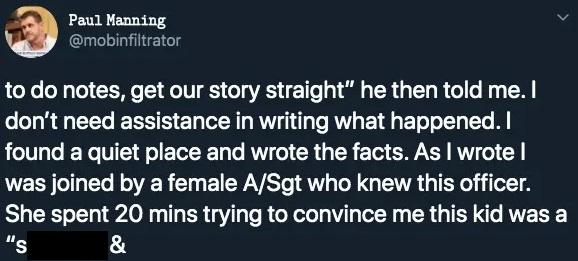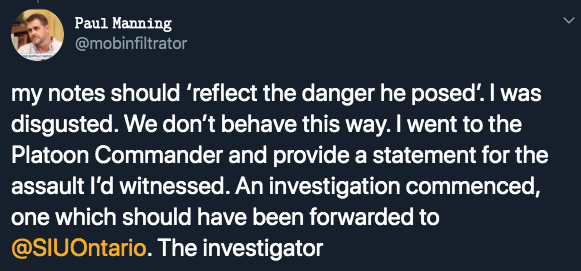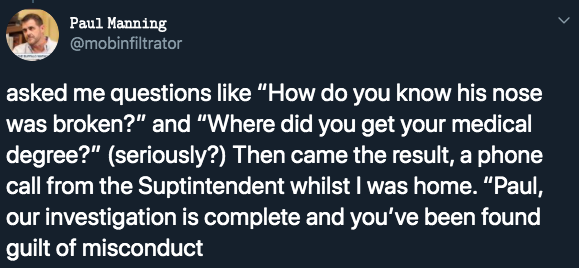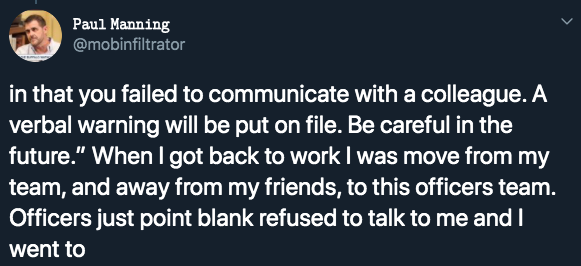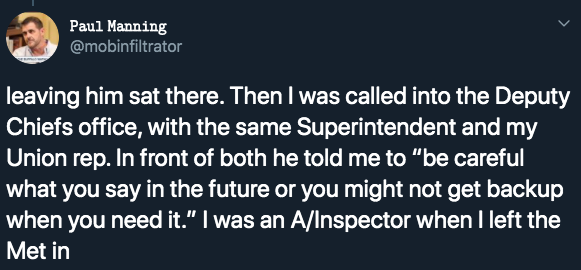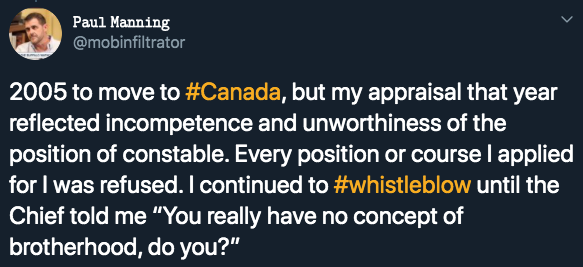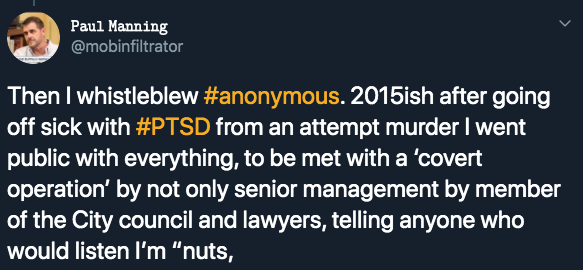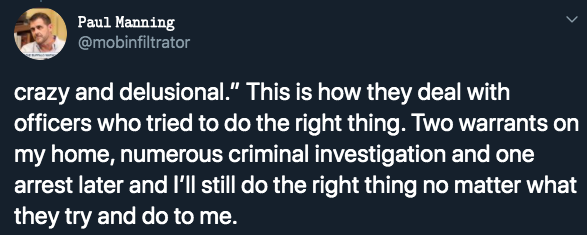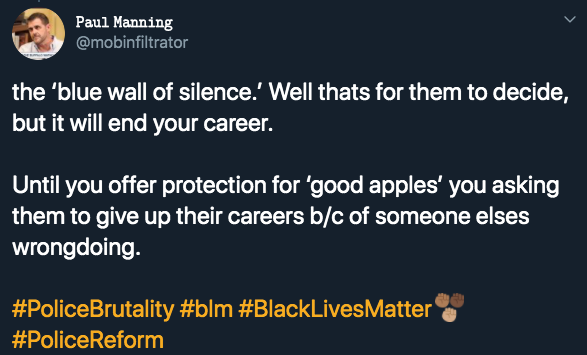Ex-Cop Explains How Cop Culture Makes It Impossible to Be a "Good Apple"
Updated June 20 2023, 8:57 a.m. ET
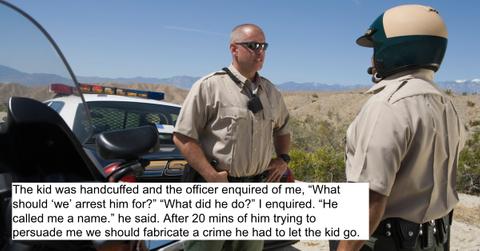
This cop was punished for trying to "do the right thing" in his work.

Paul Manning, a former cop who has spent years being punished for trying to "do the right thing" in his work, knows firsthand how difficult things can get for officers who call out the "bad apples."
In a viral Twitter thread, the former police officer explains his own experience in Ontario, Canada, which illustrates just how impossible it is for cops to be "good apples." When he tried to do the right thing, he was punished for it. This thread isn't meant to draw sympathy for a "good cop" but rather to illustrate how poisonous and insidious the whole system is.
Paul Manning took to Twitter to share his experience.
Paul watched this police officer punch a kid in the face, breaking his nose. Right in front of him, this happened. Because Paul was assisting the call, he didn't see the very beginning of the interaction between the officer and the kid.
Manning was asked to help fabricate a crime.
So, he asked the police officer what happened. He had punched a handcuffed kid. He had to have done something wrong, right? Instead, the officer asked Paul to come up with something to arrest him for. The kid had called him a name. That's all. There was no crime.
Paul flat-out refused to lie about what he saw.
But the officer who had punched the kid was insistent that that he and Paul needed to "get our story straight." Paul flat-out refused to lie about what he saw, so he stepped away and started recording the facts. That's when he was approached by a female sergeant at arms, who tried to convince him that the kid deserved what he got... even though there was no crime, no real reason to arrest him.
He provided a factual account of the officer assaulting a kid.
Paul refused to give in. He provided a factual account of the officer assaulting a kid. He wasn't about to be bullied into lying.
Eventually, Manning was the one found guilty of misconduct.
But at every single step of the way, he was met with people who tried to discredit his statement and make excuses for the cop who punched the kid in the face without reason. Eventually, Paul was the one found guilty of misconduct.
Paul was being punished for telling the truth.
Paul was being punished for telling the truth. This is how toxic the police force was. He was, ostensibly, a "good apple" trying to make change and keep cops accountable for their behavior, but the system of "brotherhood" and "having each other's backs" was more important than being noble and truthful. And Paul suffered for it professionally.
Paul was completely ostracized from the force.
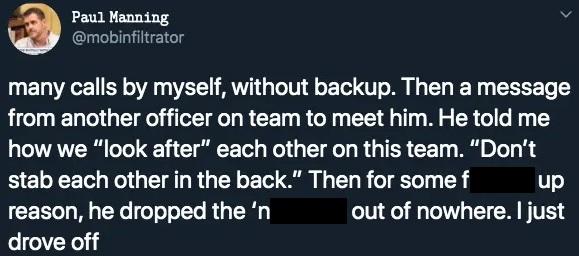
Paul was completely ostracized from the force and disciplined for not having his fellow officer's back, even though that officer punched a kid in the face and broke his nose for no good reason.
Manning was threatened by his colleagues.
At every rung of the ladder, he was told that telling the truth was a grave mistake. Imagine being gaslit like this at your job by every single person. The people that are in charge of those supposedly defending lives were telling Paul that he would suffer professionally for telling the truth.
Manning found it hard to find a new job.
Paul didn't fall in line. He refused to cover up misconduct and continued to tell the truth, and he was continually punished for it and eventually driven out of his job.
Authorities attempted to discredit Manning.
After years of trying to tell the truth, Paul said he was met with a "covert operation" by the police force as well as members of the city council and lawyers, which was meant to disparage his name, gaslight him further, and drive him out of the force.
Two warrants were issued against his address.
"This is how they deal with officers who tried to do the right thing," he writes. As for the officer who punched the kid in the face? He ended up in a very different place.
The officer that Manning spoke out against got a promotion.
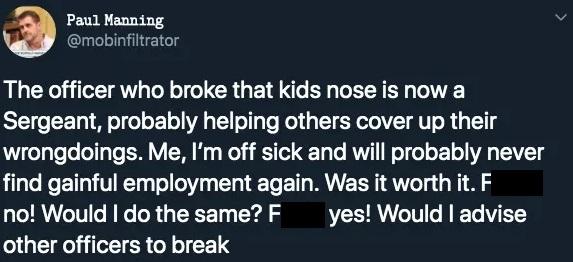
He's now been promoted to sergeant. Paul was maligned for telling the truth until he was driven out of his career. It wouldn't be surprising to learn that the same happens to other cops who try to speak out and do the right thing.
"The blue wall of silence"
The point is, no matter how many "good apples" there are, they do not have the power to change the system from within. The concept of policing in the United States was predicated on controlling Black enslaved people. As Paul points out, there is no fixing the system or relying on "good cops" to root out the bad ones. The only solution is to dismantle the police as it currently exists and build something new.
